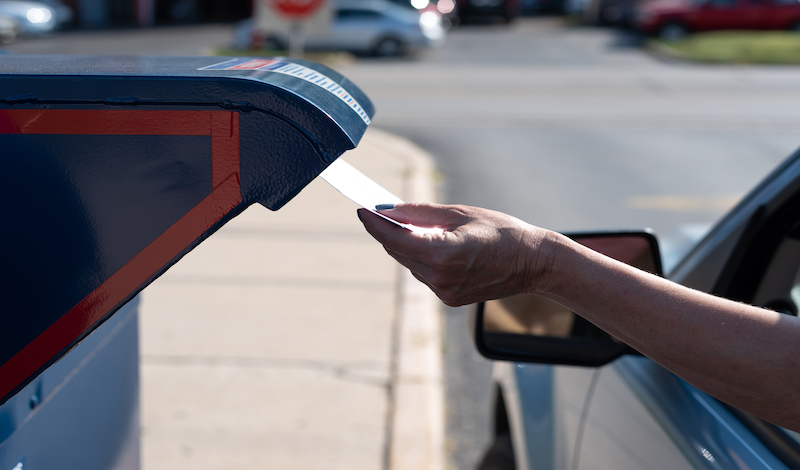
Local election officials played a critical role in facilitating free and fair elections in 2020.
The administration of elections in the United States—including elections for federal office—is highly decentralized.
Fundamental election law decisions—such as registration and voter identification requirements, and early in-person voting and vote-by-mail rules—are made by the state legislature, but the actual conduct of elections is handled almost entirely by local governments.
Local officials register voters, process absentee ballot applications, design ballots, recruit and train poll workers, manage early voting and election day operations, acquire, maintain and secure voting equipment, and count, canvass, and report the results. In most states, local officials also pay for most of the costs.
The Florida 2000 presidential election—which involved the infamous locally designed “butterfly ballot” and the inconsistent local treatment of disputed ballots that led to Bush v. Gore—called attention to the shortcomings of local election administration. As a result, the trend since 2000 has been to increase the states’ role in running elections.
The 2020 election, by contrast, underscored the value of local election administration. Much of the success of the election—record-high turnout facilitated by a massive, unheralded shift to early and mail-in voting undertaken in the midst of a once-in-a-century pandemic, with few Election Day problems and no security breakdowns or proven fraud—is attributable in large measure to the work of state and local election officials. With the vast majority of election officers working at the local level, they deserve the lion’s share of the credit.
Local administrators proved to be resilient, innovative, and attentive to local circumstances and concerns. They quickly adapted to the extraordinary circumstances of 2020 by finding new ways and places to vote, addressing the public health concerns posed by voting in traditional polling places, and recruiting tens of thousands of new and younger poll workers to replace the older workers most at risk from COVID-19.
Most strikingly, local officials around the country demonstrated a commitment—sometimes tested in court—to make it easier for eligible voters to vote. These local efforts, in turn, have triggered a backlash, with a number of states enacting new laws to curb local powers and subject local elections officers to new restrictions, burdensome requirements, and penalties.
Many local elections officials, particularly in urban areas, displayed an impressive commitment to democracy by pushing the limits of and occasionally challenging legal restrictions to make it easier for eligible voters to overcome obstacles posed by the interplay of the pandemic and state election laws.
Local elections officials used their knowledge of their communities and their connections to local schools, businesses, and other community institutions to recruit poll workers, obtain resources to fund safety precautions, find new venues for COVID-19-safe polling sites, and support voter education.
To facilitate the massive shift to vote-by-mail and to deal with voter concerns about polling places, local officials developed new programs or expanded old ones for drop boxes, curbside voting, mobile voting units, 24-hour voting, voting fairs in parks, and satellite voting centers. Existing state laws authorized some of these actions; others occupied legal gray areas, as neither explicitly authorized nor explicitly prohibited. In some instances, local election officials clashed with state officials who sought to block local democracy enhancing actions.
Notable local efforts to make voting easier, along with hostile state pushbacks, occurred in Arizona, Iowa, and Texas, all involving local efforts to expand the availability of vote-by-mail.
In Arizona, the Maricopa County Recorder sought to mail absentee ballots to all voters for the March 2020 primary. In addition, the Recorder worked to include in the instructions provided with absentee ballots permission for voters to strike out a mistake and complete the correct oval rather than treat the ballot as spoiled and apply for a new one, as state law provides. To increase accessibility for certain voters, the Recorder also fought to provide assistance by video rather than in-person to certain disabled voters. The Recorder lost on the first two of these initiatives but prevailed on the third.
In Iowa, the state’s chief elections officer, the Secretary of State, engaged in a protracted battle with three county auditors to block their efforts to “pre-populate” voters’ absentee ballot application forms with certain information already in the county auditors’ computerized databases —the voter’s date of birth, home address, and voter identification number.
This pre-population had been the practice in Iowa until June 2020 when the legislature required voters to provide all the information themselves. The auditors explained that the new law had led to a “prevalence of incorrect or incomplete request forms,” leading to more work for their already overwhelmed offices and likely increased rejections of applications from younger and minority voters.
In Texas, local officials, often led by the Harris County Clerk, repeatedly clashed with the Governor, Attorney General, or Secretary of State over local efforts to expand access to the ballot.
Local elections officers in Texas sought to mail absentee ballot applications to all voters. They also supported an unsuccessful measure to have susceptibility to COVID-19 considered a “disability” that would make voters eligible to use absentee ballots, and they challenged the governor’s directive limiting the number of drop boxes to one per county, regardless of the county’s population or size.
Notwithstanding, or, perhaps because of, these local democracy-promoting efforts in 2020, many states have since adopted new laws aimed at undermining local election administration.
Many of these laws target the very pro-voter measures taken by local boards last year by prohibiting election officials from sending absentee ballot applications to voters who did not request them, limiting the number, availability, or location of early voting places and drop boxes, and barring mobile, drive-through, curbside, or 24-hour voting.
Several states now prohibit local elections offices from accepting private donations—donations that had been critical to funding local actions last year—or impose burdensome new reporting requirements.
Most significantly, a number of states now authorize the imposition of fines or criminal penalties for local actions deemed inconsistent with state law and provide for the removal of local officials and their replacement by state designees. Indeed, state officials in Georgia recently launched the process, just authorized by a law passed earlier this spring, to replace the Fulton County election board.
It would be a mistake to overstate the benefits of local election administration. Local boards can be incompetent or taken over by ideologues, and interlocal inconsistencies in the application of election rules can be troubling. And state level officials, such as the secretaries of state in the battleground states of Michigan, Nevada, and Pennsylvania, also took important actions to make it easier to vote.
Nevertheless, the 2020 election demonstrates the value of a significant local role in running elections, much as the last year’s state-local election litigation and this year’s state legislative pushback against local democracy-advancing efforts underscore the troubling degree of politicization of the electoral process in the United States.
This essay is part of a seven-part series, entitled Regulating Elections in the United States.
"local" - Google News
September 27, 2021 at 11:08AM
https://ift.tt/39GBaQ1
The Promise and Peril of Local Election Administration - The Regulatory Review
"local" - Google News
https://ift.tt/2WoMCc3
https://ift.tt/2KVQLik
Bagikan Berita Ini















0 Response to "The Promise and Peril of Local Election Administration - The Regulatory Review"
Post a Comment